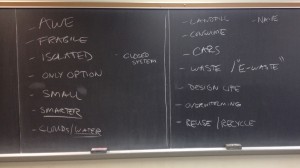After watching this video I became really curious as to how much of the information that was provided was accurate. Now, I’m not saying that there isn’t an issue with waste. I agree that sustainability needs to be incorporate into everyone’s daily lives and activities. However, I don’t believe that brainwashing is the best way to do it. At times during the video I’m not sure if it’s more about the environment and becoming sustainable, or more about disagreement with our government. It seems like this video was intended to scare people more than educate them. While the intent may be good, a different approach may be needed to get people on board with changing their lives. I went to youtube and searched for story of stuff and found a 4 part critique that someone created. I’m not saying I agree with everything this person says, there are points from the critique and from the original video that I do believe are valid. I do believe it’s worth a watch though, and then you can decide for yourselves what’s right and what’s not. Enjoy!
Page 10 of 10
People really need to stop contaminating recycling bins. In another words, it is not uncommon for people to throw any piece of non-recyclable garbage into a recycling bin, which several of those garbage pieces are too gross to touch. I sometimes spend my spare time decontaminating the recycling bins by putting my hand into the recycle bin in my dorm building to remove garbage and place them in the garbage can (and wash my hands after). If the recycling bins stay contaminated, then the contaminated recyclables end up going to the garbage.
One way of stopping contamination is for people to pay a bottle deposit for each bottle and get a refund for recycling. I mean, 11 US states already have them but I feel that all 50 states should. This way, people would pay extra money for buying bottled and canned drinks, save up the used bottles and cans, and get paid back to recycle. This practice should be included on college campuses and high schools.
This is news from December, but I thought the blog could use a little pick-me-up.
tl;dr Warren Buffet’s subsidiary, MidAmerican Energy, has ordered $1 billion worth of wind turbines from Siemens AG to be used in projects in Iowa.
It’s nice to see a bit of progress here and there, especially after having to listen to Donald Trump fighting the off shore wind project in Scotland for the past two years because he feels it will negatively impact the view from his planned golf course and hotel.
Notable quotes:
“If Congress were to remove all the subsidies from every energy source, the wind industry can compete on its own.” –Tom Kiernan, chief executive officer of the American Wind Energy Association
“MidAmerican expects to close some coal-powered plants in 2015 as the price of wind power continues to slide.” — Adam Wright, vice president of wind generation and development for MidAmerican
“Power from wind is now cheaper than power from newly built natural gas plants.” –Amy Grace, a wind analyst for Bloomberg New Energy Finance
A cool video that really lets you see how quickly earth’s ice is melting away.
http://www.npr.org/blogs/krulwich/2014/01/31/268356264/a-hunk-of-planet-dissolves-before-our-eyes
350.org is a website dedicated to climate change and was started in 2008 by Bill McKibben, an eccentric environmentalist and professor. On the page there is a short, wordless video to accentuate the importance of a global movement. I would highly suggest watching it. What does 350 mean and how can we make this number possible?
Also in the news is the State Department’s approval of the XL Keystone Pipeline, and this project is protested by McKibben and his team. Attached is the New York Times article from Friday’s paper.
http://350.org/about/what-we-do/
http://www.nytimes.com/2014/02/01/us/politics/report-may-ease-way-to-approval-of-keystone-pipeline.html?_r=0
I think this short opinion piece fits in well with the Easter Island reading. It is interesting to consider that our instincts are optimized to react to threats that present a clear and immediate danger (e.g being chased by a tiger). The piece suggests that relying on people to make sustainable choices is not an effective way to address climate change because there isn’t sufficient pressure of an immediate danger.
Below is a path to the Villanova University website which shares information as to what they’re doing on campus to improve stormwater by reducing the amount of volume of runoff and improving the quality by removing pollutants through means of stormwater BMP’s. I’m a Civil Engineer and deal with this daily so I figured I’d share what another school around the area is doing.
http://www1.villanova.edu/villanova/engineering/research/centers/vcase/vusp1.html#tb=none
Link Here.
Paul Gilding is an Australian environmentalist. “He is an independent writer, activist and adviser on a sustainable economy.”
He gives a detailed lecture about the effect of scarcity of resources and land because of the increasing population.
MetLife Stadium touts its progress toward sustainability
I saw this article while reading NPR news on my phone the other day.
Out in the Dakotas there is a formation called the Bakken shale, which contains a lot of oil and gas that has recently become economically recoverable due to hydrofracking technology. Basically they are flaring off (burning) huge amounts of cheap natural gas to get at the oil, which is a much more lucrative product on the open market. Sustainable????
And industry has apparently promised to do better, see this NYT article

Recent Comments